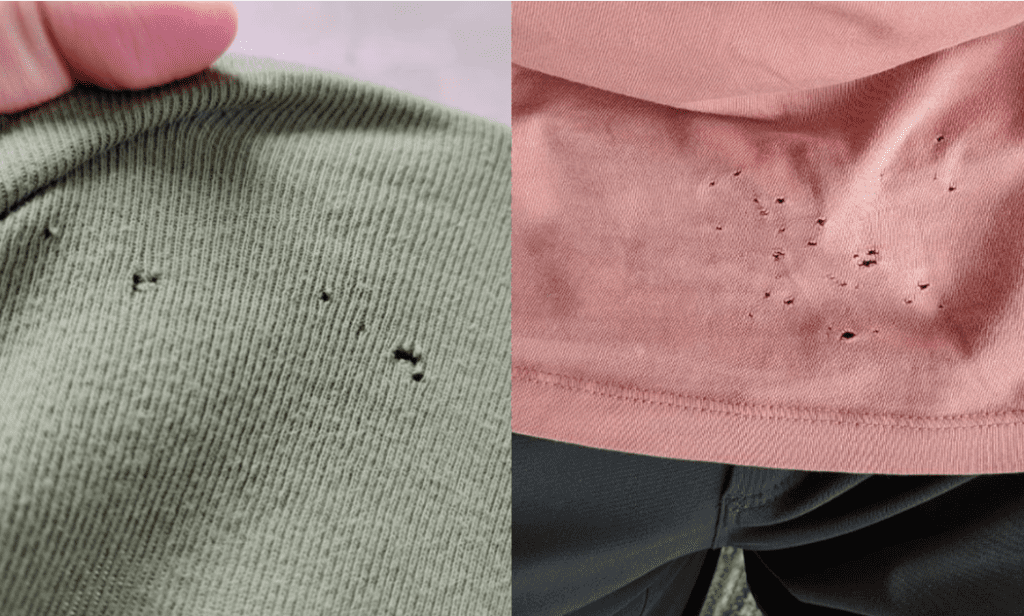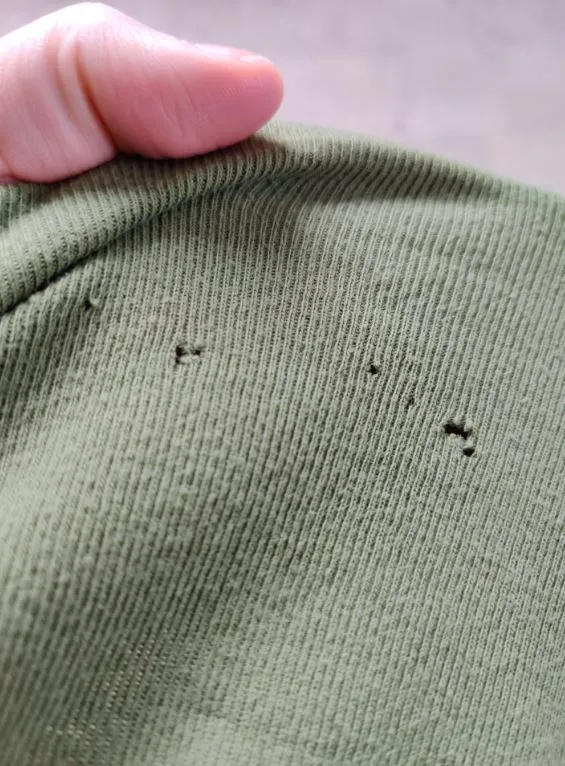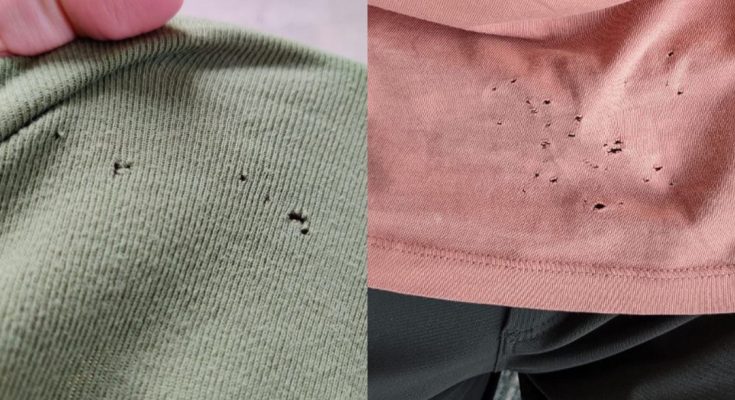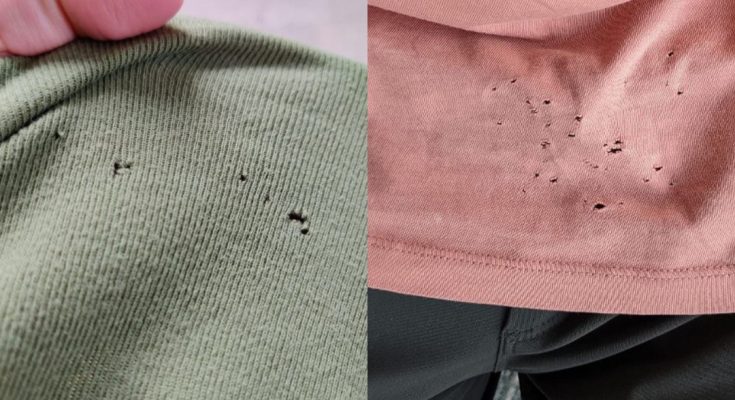Why tiny holes keep appearing on T-Shirts
Have you ever noticed small, inexplicable holes appearing on your favorite T-shirts, especially near the bottom? You’re not alone. Many people have encountered this issue, and for the longest time, it seemed like one of life’s unsolved mysteries. Recently, a woman took to social media, baffled by the recurring tiny holes in her husband’s T-shirts. Her query sparked a lively discussion, with users offering theories and solutions.
Let’s delve into the causes behind these mysterious holes, the solutions offered by experts, and some practical tips to keep your T-shirts looking new for longer.

A Woman’s T-Shirt Dilemma Goes Viral
A frustrated woman shared her experience on the popular Mrs Hinch Cleaning Tips Facebook group, asking for advice on a peculiar problem. She noticed that her husband’s T-shirts consistently developed tiny holes near the bottom, often after just a single day of wear. What puzzled her even more was that her own clothes remained untouched.
She posted a photo showing the small holes clustered near the belly button area of her husband’s shirts and wrote, “Why does this always happen to my husband’s T-shirts? He can wear a brand new tee, and within a day, there are holes. All my clothes are perfectly fine. Any advice would be gratefully received.”
Her question quickly gained traction, with social media users chiming in to offer explanations and solutions.

Social Media’s Theories on the Mysterious Holes
The post received an overwhelming response, with users suggesting various theories to explain the appearance of these annoying holes. Here are some of the most common ideas shared:
1. Friction From Belt Buckles or Jeans Buttons
Several users pointed out that the problem might lie in friction caused by metal hardware on pants, such as belt buckles or buttons. One user explained, “This happens when a belt or button on your pants rubs against your shirt, especially if you lean against counters or hard surfaces like a sink.”
Another person added, “Try tucking in the shirt when doing activities like washing dishes or working at a counter. It made a huge difference for me!”
2. Washing Machine or Dryer Snags
Some users speculated that the culprit could be the washing machine or tumble dryer. A small defect, such as a loose metal component or sharp edges, might snag the fabric and cause holes. One user shared their experience: “It was happening to my clothes until we realized our dryer had a tiny metal bit sticking out. Once we fixed it, the problem stopped.”
3. Hoodies and Zippers
Another theory was that zippers or rivets from hoodies could accidentally snag T-shirts, especially during everyday wear. One person noted, “I always get these holes because my T-shirt gets caught in the zipper of my hoodie!”
The Real Cause: Friction Against Metal Hardware
While the theories varied, stylists and clothing experts agree that the primary cause of these tiny holes is friction. Alison Gary, a stylist and founder of Wardrobe Oxygen, provides a detailed explanation. According to her, “The pinholes are usually caused by friction against the metal hardware on jeans—your button, rivets, zipper, and even the thick knots of thread around the fly can wear down knit T-shirts.”
These small, repetitive movements—such as leaning against a countertop or brushing the shirt against a belt—gradually weaken the fabric, leading to tiny holes.
Simple Solutions to Prevent T-Shirt Holes
If you’re tired of dealing with ruined T-shirts, don’t worry. There are easy fixes that can help protect your clothes. Here’s what you can do:
1. Tuck In Your T-Shirt
One of the simplest solutions is to tuck your T-shirt into your trousers. Even a half-tuck can create a barrier between the shirt and the metal hardware on your pants, reducing friction. This small adjustment can make a significant difference in preserving the fabric.
2. Choose a Belt That’s Gentle on Fabrics
If belts are a must for your outfit, consider switching to a fabric belt or a buckle-free option. These designs eliminate the sharp edges that can rub against your T-shirts, keeping them in better condition.
3. Inspect Your Washing Machine and Dryer
Check your washing machine and dryer for any loose parts or sharp edges that might snag clothes. If you find any, repair or replace the damaged components to prevent further issues.
4. Be Mindful of Zippers
If you’re wearing a hoodie or jacket with a zipper, take care to avoid catching your T-shirt in the zipper’s teeth. Zipping up slowly and keeping your T-shirt smooth beneath the hoodie can help prevent snags.
Why Women’s Clothes Are Less Affected
Many people wonder why this problem seems to affect men’s T-shirts more than women’s. The answer lies in the fit and length of the shirts. Men’s T-shirts often hang longer and sit closer to the belt buckle or jeans button, making them more prone to friction. Women’s tops, on the other hand, are typically shorter or more fitted, which reduces the likelihood of contact with metal hardware.
The Takeaway: Protecting Your T-Shirts for the Long Haul
At first, the tiny holes appearing in T-shirts might seem like a mystery, but the explanation is actually quite simple. Friction from metal hardware like belt buckles, zippers, and jeans rivets is the primary cause. The good news? Preventing this issue doesn’t require drastic measures—just a few small changes to your habits can go a long way.
Tuck in your shirt, opt for gentler belts, and check your appliances for potential snags. With these easy adjustments, you can keep your T-shirts looking fresh and hole-free for much longer.
What’s Your Theory? Share Your Experience!
Have you experienced this problem with your T-shirts? What’s your theory behind these mysterious holes, and have you found a solution that works? Share your thoughts in the comments below—we’d love to hear from you!
And if you found this article helpful, why not share it with a friend who might be dealing with the same issue? After all, everyone deserves to enjoy their favorite T-shirts without worrying about tiny, pesky holes!




